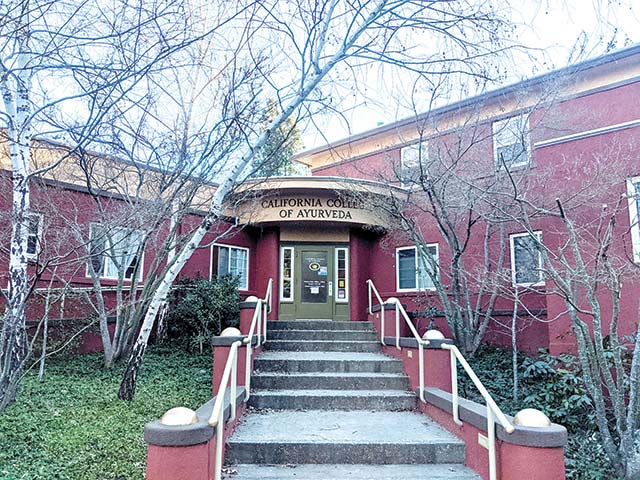By Trina Kleist
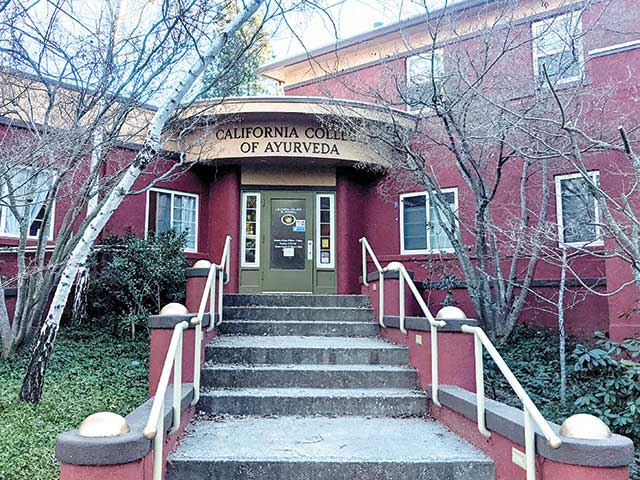
A garden in Nevada City grows a glorious tangle of healing herbs. Some are familiar, such as basil and echinacea. Others are unfamiliar in the West, such as dashmool and ashwagandha, but well-known in India, where they are among more than 600 plants used in the traditional healing practice of ayurveda.
Students at the California College of Ayurveda plant, cultivate, harvest and process these fragrant friends to cleanse the body of toxins, defend against disease and bring balance to body, mind and spirit. Herbal remedies are just one element of ayurvedic treatment, which also uses diet and lifestyle changes to transform one’s life.
From ayurveda’s ancient perspective, each one of us has a unique constitution and set of individual tendencies that determine how we respond to the daily challenges of life, including the historic challenges of the novel coronavirus pandemic.
“This has been a tremendously stressful period of time for everybody. People were managing their stress, then the pandemic happens, and they can’t manage it anymore,” says Mark Halpern, an ayurvedic doctor and founder of the California College of Ayurveda. As lockdowns shuttered the places where we find nourishment and outlets for pent-up energy – schools, offices, churches, restaurants, social organizations, music venues, dance clubs, gyms – we coped according to our pre-existing tendencies.
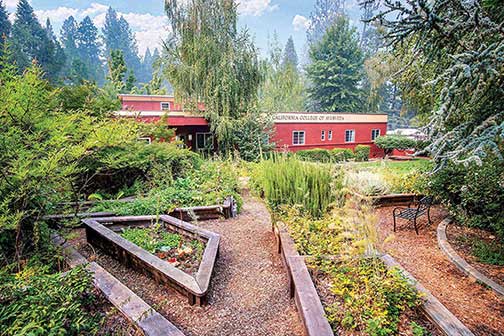
For better or worse.
As a result, “the person with a tendency toward drink is drinking more. The person with a tendency to smoke is smoking more, eating more,” Halpern observes. “We have a lot of tendency for depression, for anxiety, already present in society.”
Like other medical systems, ayurveda sees mental health flowing from a web of physical, social, behavioral and spiritual aspects. By looking at a person’s essential constitution and one’s natural tendencies, ayurveda offers pathways to restoring one’s natural balance and bring healing, transformation and health.
To find that pathway, an ayurvedic professional conducts an in-depth interview to determine the client’s individual constitution and evaluate the behavioral tendencies related to physical and mental health. A treatment plan seeks to restore the client’s three life forces, or doshas, to the balance established at conception. Herbs from the garden and imported directly from India may be part of that path. Diet, physical activity and detoxification typically are considered, too. Depending on treatment, the professional may support the client by setting goals, holding weekly meetings, offering guidance and using tools such as email to keep the client focused on health and transformation.
“Through ayurvedic counseling, we’re working with you to create new habits that are going to be healthier,” Halpern says.
What is Ayurveda
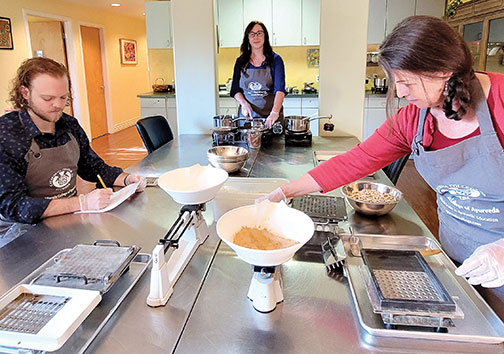
Balance of body, mind and consciousness is the concern of ayurveda, a traditional healthcare system practiced in India and much of Asia. Texts describing ayurvedic treatment go back 3,000 years, while an oral tradition goes back another two millennia. The word ayurveda, from the ancient language Sanskrit, means “knowledge of life,” according to the National Ayurvedic Medical Association.
“Ayurveda is a journey of healing emotionally and physically,” says Mark Halpern, an ayurvedic doctor and founder of the California College of Ayurveda, in Nevada City. “It’s a path to understanding what is right for you.”
Ayurveda proposes that each of us is born with a unique natural constitution, determined at the moment of our conception and defined by the balancs e of three life forces, called doshas. These forces govern motion in body and mind; metabolism; and structure, “down to the level of neurons in the brain,” Halpern says. When these life forces are in their original proportion, we have balance and are healthy. In addition, flowing from each person’s unique constitution are tendencies that express themselves throughout our lives.
Events in our lives – unhealthy food and activities, daily challenges, things that happen to us, pandemics – can disrupt this balance. Our own tendencies can help us through or can make our problems worse. The result is distress and disease. The goal of ayurvedic treatment is to heal disease by restoring balance and order.
“Within the body there is a constant interaction between order and disorder,” Halpern says. “When one understands the nature and structure of disorder, one can re-establish order.”
In the United States, ayurvedic treatment is practiced by three levels of trained professional: ayurvedic counselors, practitioners and doctors. At the local College of Ayurveda, clients start with a two-hour evaluation to understand everything the client does in the course of day. The goal is to understand the imbalances and disease a person is experiencing so treatment can be recommended.
“We’re trying to unwind all the disturbances that have happened. There’s been a lot for all of us,” Halpern says.
Spirituality is a key component of mental health in ayurveda
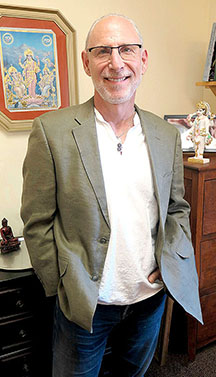
Mark Halpern already had a spiritual practice before the novel coronavirus pandemic started more than two years ago. As part of his practice, he spent time each week at home in a room outfitted especially for meditation.
Now, the ayurvedic doctor and founder of the California College of Ayurveda, in Nevada City, spends even more time in his meditation room. His spiritual practice has helped him navigate the complex mental and emotional challenges of COVID-19. He encourages others to develop a spiritual practice, whatever that may mean or entail, as a key component of mental health as we heal the pandemic’s lingering trauma and face new challenges.
While the ancient medical framework of ayurveda considers body and mind together, it also considers a third element, translated into English as consciousness.
“Consciousness is the awareness behind the mind, that part of me that observes that I’m anxious, that observes my thoughts, my feelings,” Halpern says. “Consciousness can sometimes be understood as the soul, or spirit… that part of the Divine that exists within each person.
“When we are living in full alignment with the Divine that is within us, the mind becomes clear and calm. When we’re not living in alignment with the Divine, the mind becomes disturbed, and all our natural tendencies become exacerbated,” Halpern says.
It doesn’t matter how you define divinity, spirituality, God or something greater than yourself. What matters is that you connect with it and cultivate that connection, he adds. Those of us who struggle with that aspect of ourselves have probably had a harder time amid the stress of the pandemic. But, like our bodies and mind, our consciousness can be strengthened and healed.
“In ayurveda, we have ways to support people to experience that connection and relationship with the Divine,” Halpern says.
Kylene Yumul contributed to this report.
